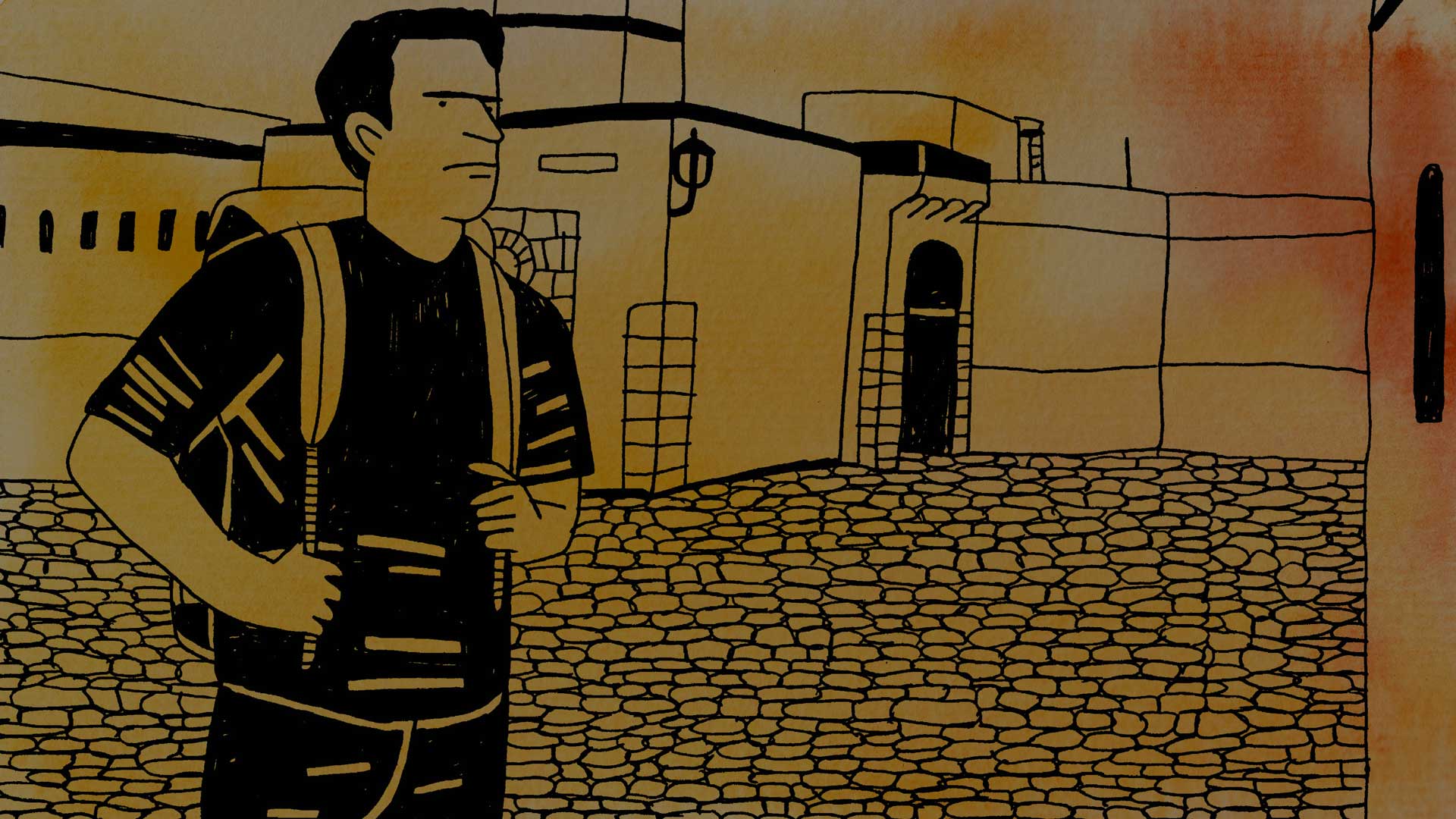Fayçal was born into a fairly well-to-do middle-class family but grew up in a working-class neighborhood. Employed in his parents' business, he is financially independent and has a stable life.
After the revolution, his conservative " entourage" encouraged him to turn to religion. He began attending the local mosque and the " dourous:" theology classes given by the imam. Both on the news and in social media, the Syrian conflict is constantly being discussed, and Fayçal began to take an interest. " Women and children being massacred, it's impossible to remain insensitive," he recalls. " Many young people left feeling convinced that they had to help their Sunni brothers."
The departure
It’s 2013 and Fayçal is 24 years old. For months now he has been witnessing the departure of his friends who have gone to fight in Syria. Increasingly torn by his desire to accomplish jihad, he decides to join them. " The Salafist movements, the internet, friends who left, the situation in Syria, personal problems..." all these reasons push him to leave. He also hopes to " win something, whether in this life or hereafter."
Without saying anything to his family, he begins to organise his departure and asks his friends who are already there for the " contacts of the smugglers." First step: Istanbul.
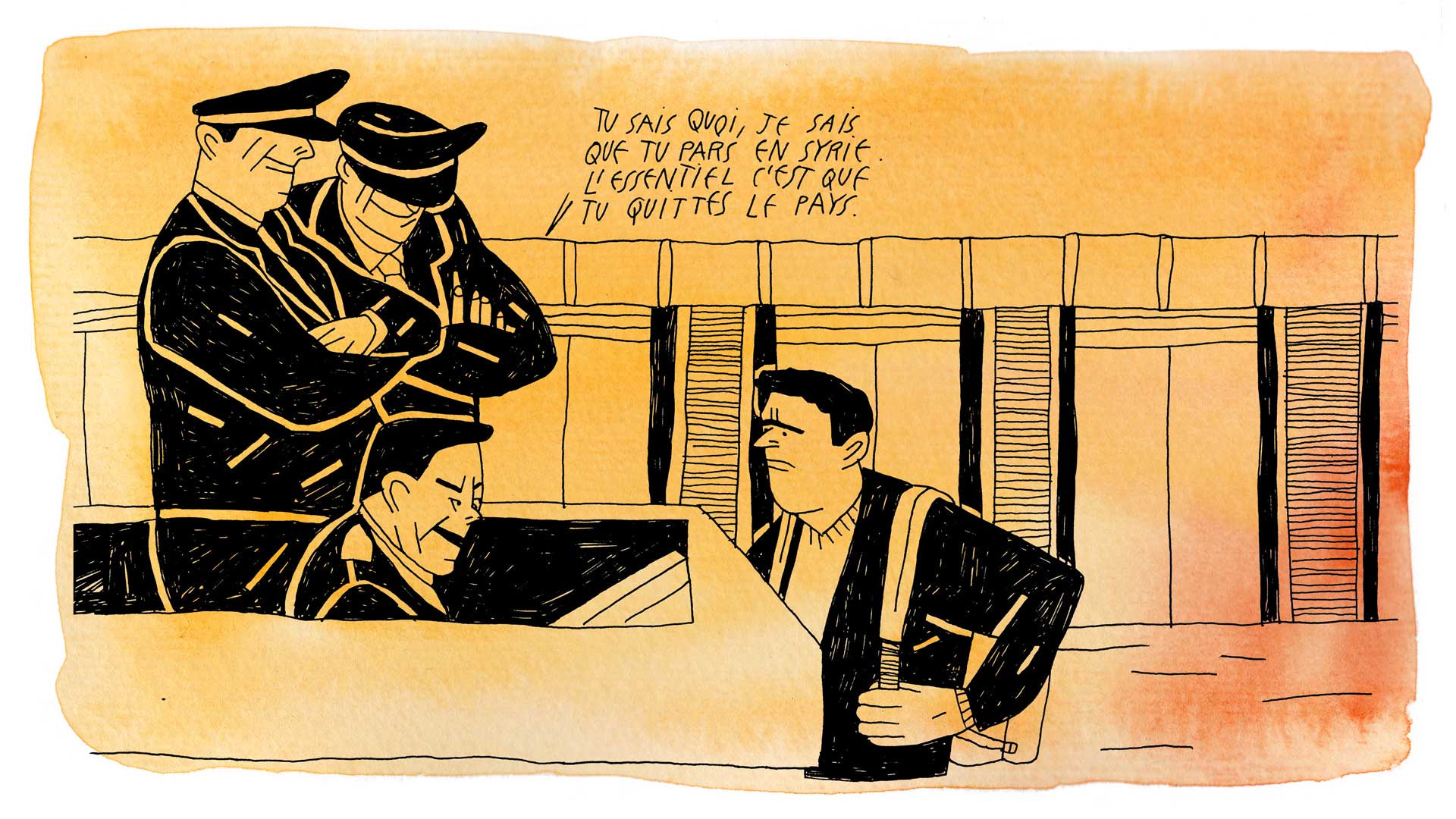
"I know you're going to Syria, good riddance."
At passport control at Tunis-Carthage Airport, the officer stares at him for a long time. " I know you're going to Syria, good riddance," he says to Fayçal. It is a remark that has stayed with the young man. " It was very painful. After all, I love my country."
In Istanbul, Fayçal is not worried. Turkey is a country Tunisians can visit without a visa. But the young man is marked by the indifference of the authorities as Tunisians continue to cross the border daily with the obvious aim of joining Bashar al-Assad's opponents.
Fayçal is instructed to go to Şanlıurfa, commonly known as Urfa, 1,300 kilometers from Istanbul. From there he can reach the Akçakale border post that divides Syria from Turkey. While in Şanlıurfa, he meets a Tunisian friend who is also trying to cross the border. Together, they meet their contact, a Syrian smuggler. The latter slips a note to the Turkish policeman who turns his head away as they pass.
On the other side, another Tunisian welcomes them and takes them away into the night. Next stop for Fayçal: Deir ez-Zor.
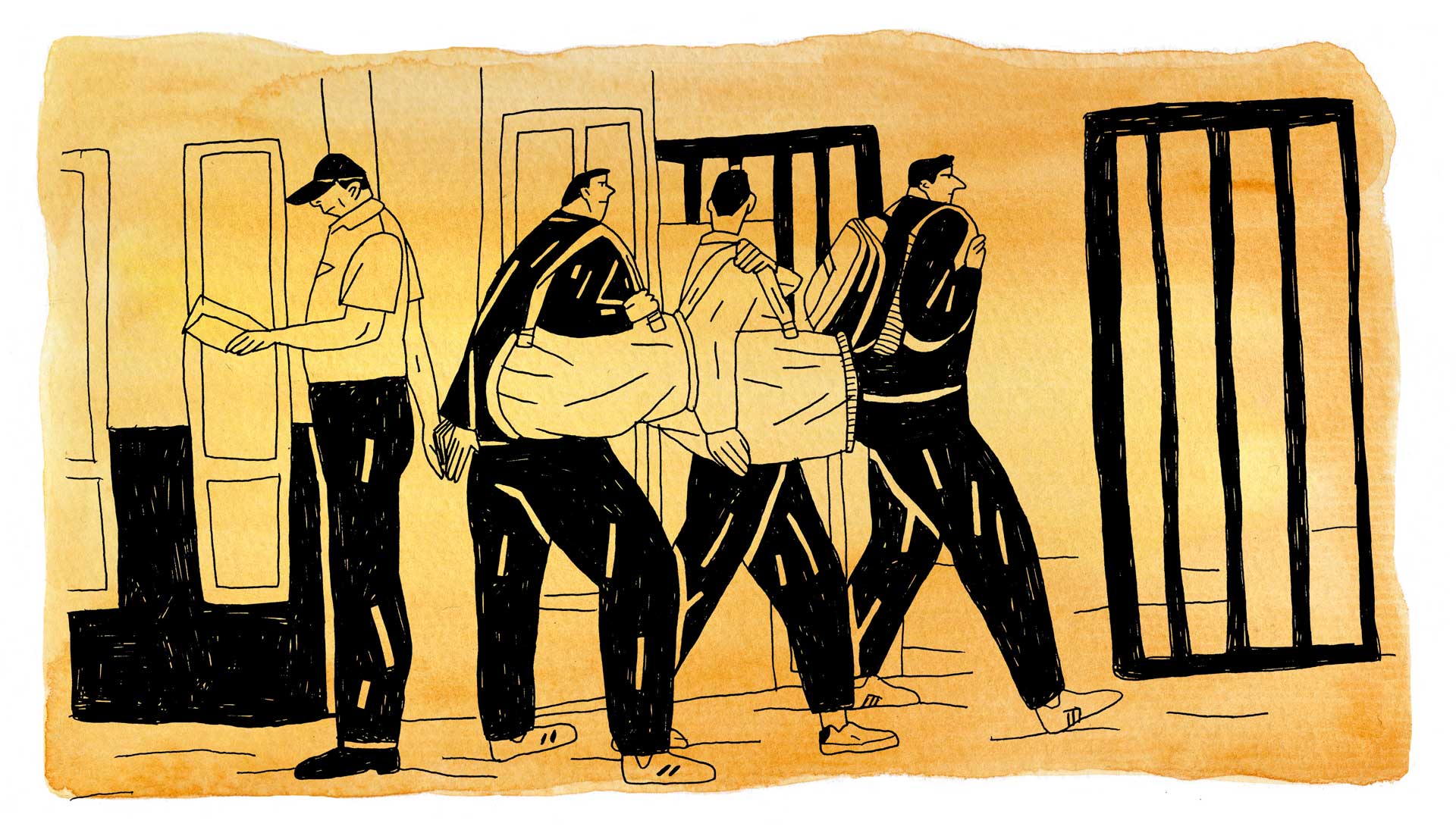
put to the test
At the time, the town of Deir ez-Zor, located 250 kilometers southeast of the Akçakale border crossing, is almost completely under the control of opponents of Bashar al-Assad's regime. The main rebel group is the Free Syrian Army (LSA), which is allied with various Salafist groups.
Initially, Fayçal decides to join the ranks of Jabhat al-Nosra, a group affiliated to al-Qa'ida, with many other Tunisians. There, he will be called "Abu Islam," a nickname given to him in homage to a young man from the same town who " fell as a martyr" two days earlier.
He is placed in a space reserved for new arrivals, which fighters of Jabhat al-Nosra call “‘ The welcome.’’ He was supposed to be treated as a " guest," but in reality, he is a prisoner on probation. Members of the group scrutinize his every move. Mistrust reigns.
" I didn't get along with the group, especially with the Tunisians," says Fayçal. " Between the image they give themselves in their videos on the internet - that of the prophet's companions - and what they really are, cold and calculating, there's a gap."
"It's just a trick to bait the young."
On a daily basis, one must systematically obey any orders given to them. The slightest deviation is punished, from prison to execution. " Now that you're far from home, they know you can't go back," sighs Fayçal.
Fayçal is not in the correct shape to be doing physical activity, especially in the sweltering heat of the desert that surrounds the city of Deir ez-Zor. He tries to warn them. "I told them I was fat and couldn't run, especially in this heat. Sport is not for me. As soon as I ran a little, my thighs started chafing," he admits, embarrassed.
In response, his companions, " especially the Tunisians," accuse him of taking his mission lightly. Fayçal feels judged and his relations within Jabhat al-Nosra slowly deteriorate. He then turns to another allied group, Ahrar al-Cham.
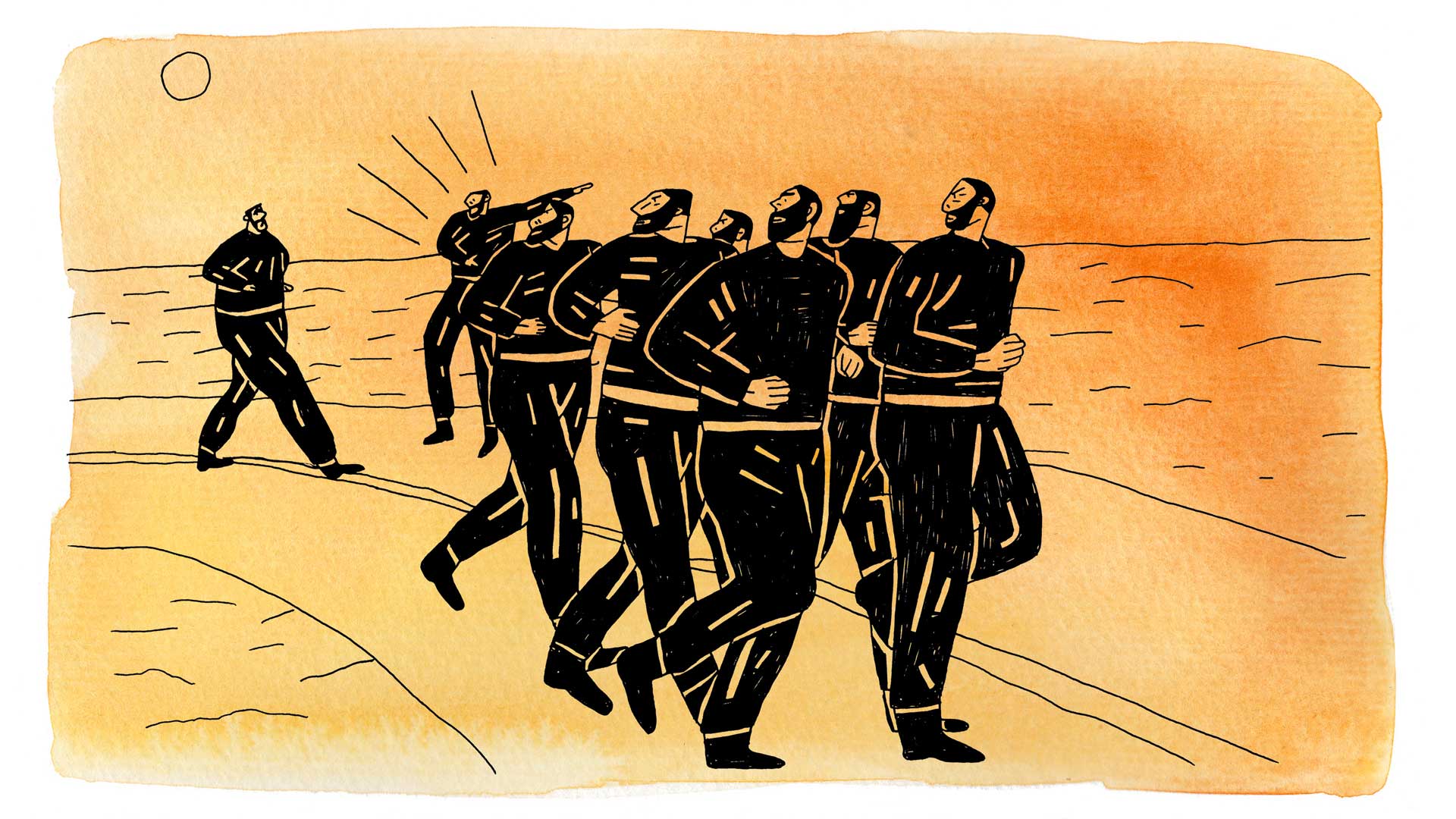
Initially, he is responsible for carrying out small logistical tasks. Administration, Policing, Judiciary, "everything is organized there, like in a state system," says Fayçal.
Thanks to the oil and gas reserves, and arms trafficking, Deir ez-Zor enjoys certain economic benefits. " There were more than 120 wells controlled by local tribes and rebel factions," describes Fayçal, "that generate hundreds of thousands of dollars a day.’’ He says the Free Syrian Army (LSA), the main opposition group to Bashar al-Assad, and its allies would sell this oil - mainly to Jordan and Turkey - through intermediaries.
Thanks to this economic prosperity, couples and families living within rebel-controlled neighborhoods have free housing and financial support. As for unmarried individuals, they receive a " meager" monthly sum of 10,000 Syrian pounds: barely 55 Tunisian dinars.
The threat of DAESH
Fayçal feels more settled in Ahrar al-Cham and helps administer the distribution of money and food. When Deir ez-Zor was later surrounded, he is named "Emir (Commander)” and made responsible for managing wheat resources, " vital in times of siege." On top of that, he is in charge of the distribution of medicines. " The Free Army collects them from the Red Crescent and then distributes them to the other (allied) factions," describes Fayçal.
Many nationalities are represented among the fighters. Most are from Arab countries, such as Tunisia, Iraq, Libya, Saudi Arabia, and the Gulf. Then come the Chechens, Uzbeks, Tajiks, some Sunni Iranians and, to a lesser extent, Westerners, Europeans or Americans. " There are even jihadists from Trinidad and Tobago!"
In this system, Tunisians, by virtue of their numbers, occupy important places. They manage to take key positions in the military and the judiciary. " Some are magistrates, others get command posts," Fayçal explains, " but the others - and they are the most numerous - do the dirty work and attack houses."
In his experience, Tunisians are " hated by the Syrians," who fear and avoid them.
"Many come from difficult neighborhoods, have no schooling, or have recently spent time engaged in criminal activity. Imagine them with guns and power."
When Fayçal arrives in Deir ez-Zor, the situation is stable. The Free Syrian Army and the other rebel groups live together peacefully despite overlapping in many different locations throughout the region. During this early period, Daesh (Islamic State in Iraq and the Levant) is just one jihadi faction among others.
" When Daesh arrived, the problems started," says the young man. " They called everyone a disbeliever, they had no mercy," he recalls.
On Facebook or Skype, Fayçal sometimes talks to Tunisians who have joined Daesh's ranks. The young man describes his fellow citizens as " brainwashed" and "completely under the control of [their leader, Abu Bakr] al-Baghdadi." They are " incapable of reasoning for themselves."
"They didn't hesitate to kill other Tunisians, as long as they didn't belong to Daesh.’’
Little by little, Fayçal sees Daesh gaining ground. In Deir ez-Zor, the group takes over several neighborhoods and a few oil wells. " Sometimes oil and gas were sold to the Syrian regime," says Fayçal. " You could see their big tanker trucks moving freely around the territory.’’
Daesh eventually declared war on the rebels. Fighting broke out between them and a coalition made up of the Free Syrian Army and other Salafist factions such as Jabhat al-Nosra, Al Jabha al-islamiyya, and Ansar al-Cham. It was a battle that lasted several months.
"It was a massacre. Fighting of a ferocity that surpassed those against the regime's army. And Daesh won."
The escape
After this defeat, Fayçal fled the city in a hurry with the other survivors in a convoy of several hundred vehicles. " The escape from Deir ez-Zor was a nightmare," Fayçal described. " We were completely surrounded.’’
The convoy quickly became the target of fire. On one side, Daesh's fighters chasing them from Deir Ez-Zor, while on the other, the forces of Bashar al-Assad ambushing them at the entrance to the southern city of Deraa. " Bullets were flying and helicopters were soaring over us with their torches lit. They were shooting at us with big guns and rockets," says Fayçal. That night, more than 200 men died.
Conditions in Deraa are more difficult than in Deir ez-Zor. The city is at the heart of the fighting between the regime's forces and the rebels. The battles are fought in close quarters. " You had to make holes in the walls of the houses to get from one place to another and escape the snipers," he recalls.
Fayçal is not a fighter. In fact, he says he has never killed anyone. " They could have sent me into combat, but I didn't have the physique, so they gave me other tasks," he says. But in truth, there is very little for him to do in Deraa. As a city, it is far less economically prosperous than Deir Ez-Zor. " The main sources of income here are agriculture and the arms trade," he says. Fayçal helps the fighters from time to time and also conducts surveillance rounds.
In this city, the young man witnesses massacres he can hardly evoke. " Bashar's army did horrible things to the citizens. By withdrawing from a neighborhood, they perpetrated organized massacres. They tortured, raped women, slaughtered old men and even children... "
According to him, the regime almost never confronts the rebel forces head-on. It would prefer to bomb the population in order to incite a civilian revolt against rebel forces. The goal? " To make people regret the revolution ever happened. Let them think it was better before."
Fayçal says that on several occasions while facing the regime's army, the rebel fighters were attacked by Daesh from behind. " You can't know who's with whom, you can't trust anyone. You have to be a wolf among wolves."
Fayçal also notes that the Free Syrian Army established close links with Jordanian military intelligence, whose border is only a few kilometers south of Deraa. He claims that the Jordanians allowed ASL officers to have access to an " American base" in Jordan. This location allowed them to " train and receive logistical assistance." These statements were later confirmed by ASL fighters who stated that they had received this type of training.
Before every major military decision, Fayçal claims that the Free Syrian Army sought the agreement of Jordanian intelligence. " It was a source of tension with other factions, especially among Islamist groups that forbid dealing with 'these governments of miscreants.’’’ But for Fayçal, the attitude of the Salafist’s is entirely contradictory. When they are in need, they do not hesitate to use weapons and logistical support from these same governments.
According to his testimony, the Turks have the same role in northern Syria. " This is the border where everyone comes in and out," he says. " The wounded also, whether they are from Daesh or other factions, go to Turkish hospitals for treatment."
Faced with all these conflicting interests and discrepant collaborations, Fayçal increasingly feels that his motivations for being in Syria are escaping him. What he has discovered in Syria goes far beyond what he was expecting. before his departure from Tunisia.
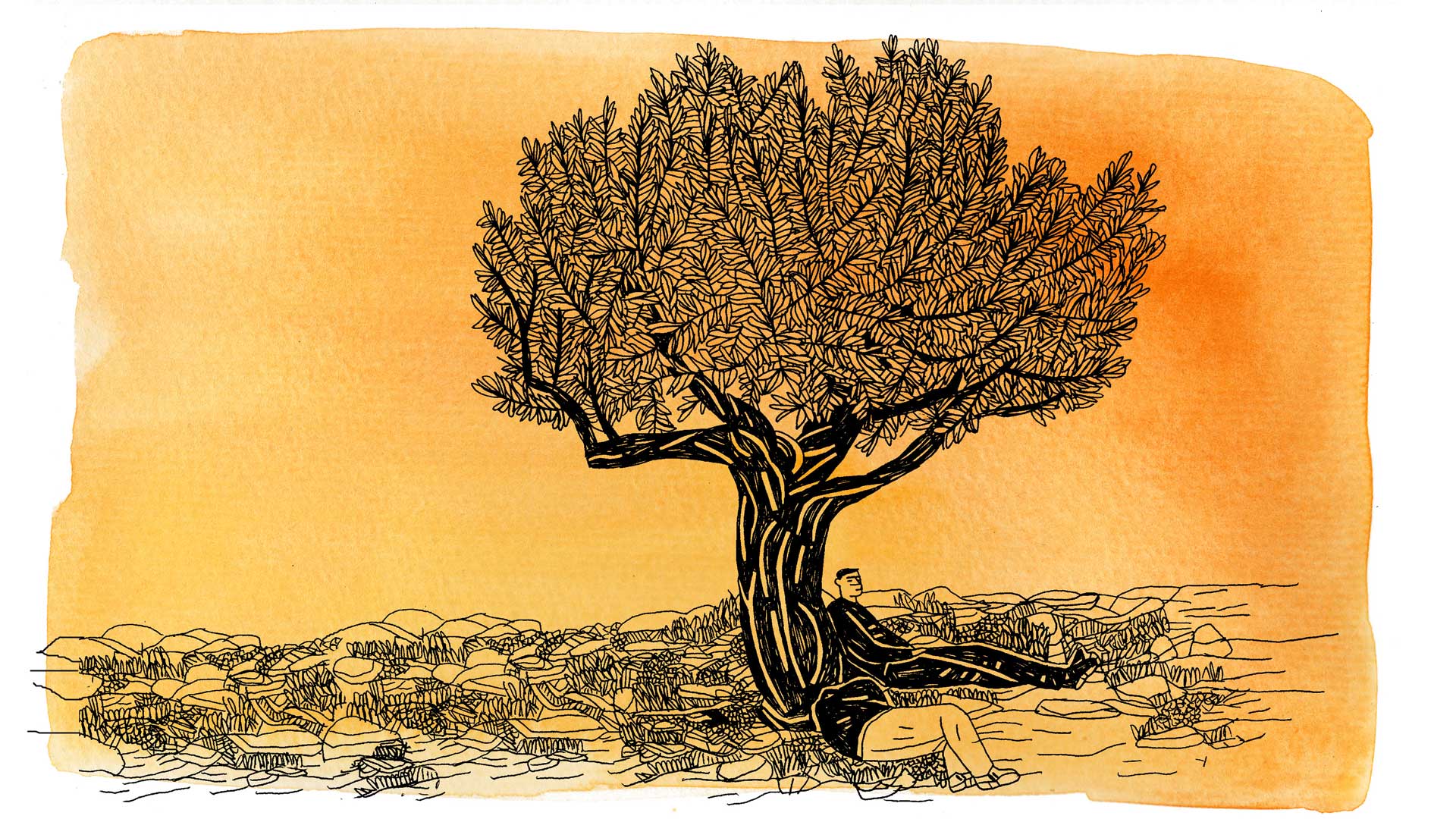
Disilussion
Fayçal feels out of place and wonders what he's doing here. " You're going off to do jihad in the name of Allah, but that's not it at all. You go to save people, not to kill them... I didn't mean to do that."
The young man is overwhelmed by the complexity of events in Syria. " They come to tell me, this one is Shiite, this one is a traitor... You can neither verify nor contradict them, it's too dangerous," he exclaims.
One evening, his group is given a special mission concerning a man who stood accused of kidnapping a woman and children on behalf of the Assad regime. " Those who were with me killed him and grabbed a safe box," says Fayçal. He learned that the victim was a gold salesman and that the only purpose of the expedition was to steal his wealth.
For Fayçal, the dishonest intentions of most rebel factions and their commanders are becoming clear. " Everything I saw and heard made me doubt myself more and more every day.’’
Despite the risks, Fayçal then considers abandoning everything and returning to Tunisia. But the young man cannot trust anyone. " If you say you're thinking of leaving, they start putting you on dangerous missions where you're sure to die..."
On several occasions, Fayçal witnessed summary executions of foreign fighters. It is certain that these victims wanted to flee. " You can't even confide in another Tunisian," he says. " He'll think that when you come back, you'll give his name or compromise his position.’’ Fayçal knows very well that by returning to Tunisia, he risks being prosecuted, imprisoned, and tortured. But his decision is made.
‘‘I'd rather be in prison in Tunisia than go on living like this."
During the months he spent in Syria, Fayçal managed to get his family on the phone regularly using Iraqi and Jordanian networks. But the conversations are painful both for him and his family. The young man decides not to call them anymore, " so as not to hear them cry."
It was several weeks after their last conversation that Fayçal decides to contact them again to arrange his departure. But first, he has to get out of Deraa.
The return
Fayçal tries to find a way out of their fortress. " The road to Deraa is completely blocked. Between Daesh on one side and the government on the other, it's hard to escape."
He tells his Syrian friend from Deir ez-Zor that he wants to go north to Aleppo, near the Turkish border. " I didn't tell him I wanted to leave, but he understood very well," says Fayçal. The man he considers to be his brother quickly finds a solution for him. An oil smuggler has set up a space in the tank of his tanker truck and regularly uses it to smuggle people.
Fayçal's friends arrange for him to leave and the young man sets off in the direction of Aleppo, hiding in the back of the truck.
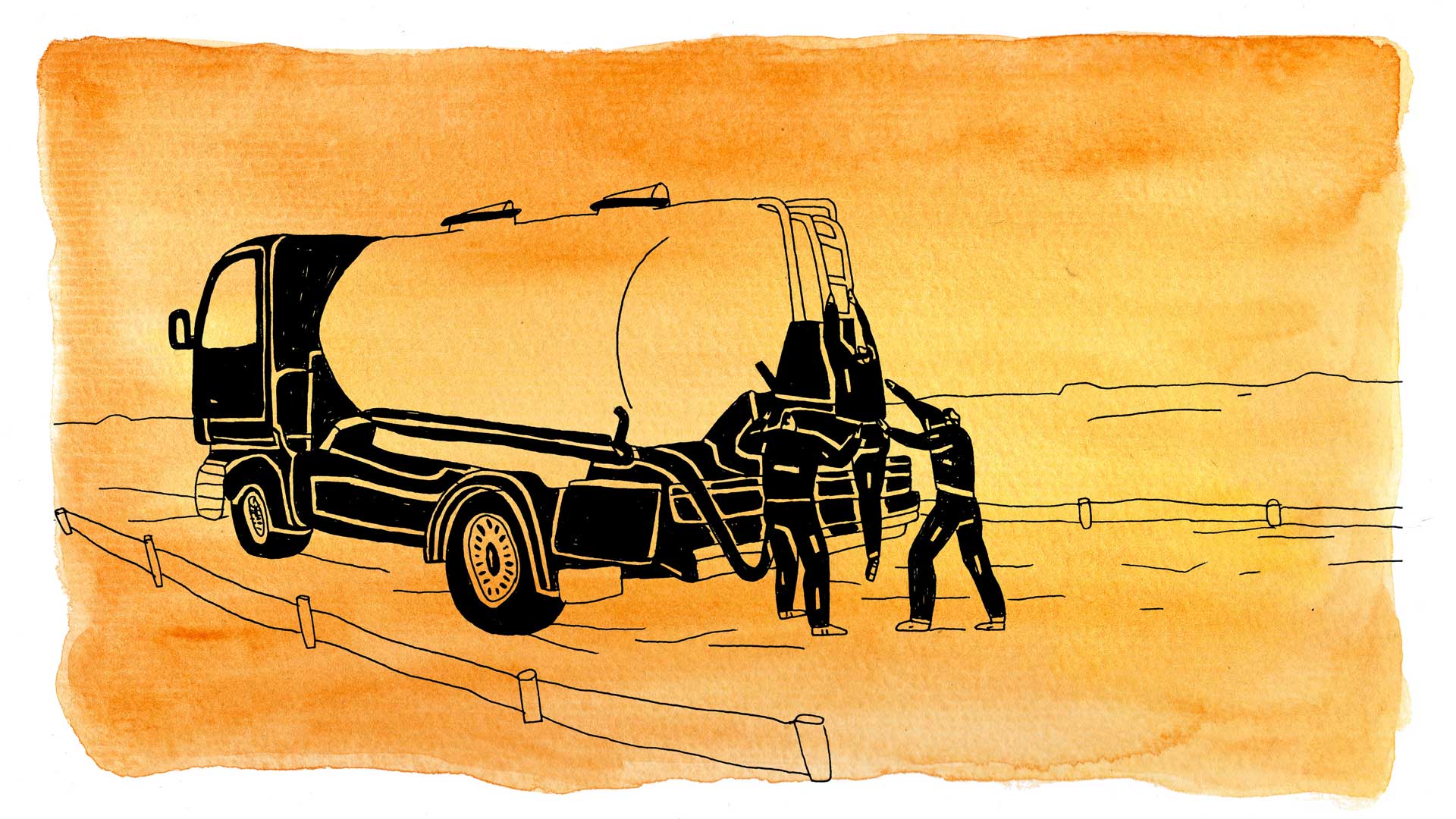
The journey takes several days. The truck makes numerous stops and detours to avoid the regime's army checkpoints along with the checkpoints of other factions. It is also necessary to take a few breaks to rest and refuel. Bedouins living in tents welcome them generously but most of them are committed to the cause of the Islamic state. "I passed myself off as a deserter from Jabhat al-Nosra who was trying to reach Daesh," says Fayçal. ‘‘It's the only way to get out alive.’’
Fayçal eventually arrives in Aleppo, where he stays for less than a month while he organizes his escape. Soon, he finds himself on his own. As a foreigner, he finds it difficult to find a place to stay. " Syrians have their homes, but no one takes care of foreigners. I slept under an olive tree several times, but no one in charge was worried about me. For them, foreigners come to die."
Finally, Fayçal finds a way to leave Aleppo. Another Syrian friend comes to his aid and organizes his passage, after which a Turkish contact can accommodate him on the other side of the border. To get there, Fayçal first takes a bus to Azaz, an hour's drive north of Aleppo. The rest of the journey has to be done on foot, on steep paths.
The biggest risk for him is a buffer zone that runs 500 meters either side of the border. The zone is controlled by the Turkish army. For Fayçal, the calculation is simple. " Either I die or I pass."
As he tries to cross, a Turkish patrol makes its rounds. " I threw myself to the ground and held my breath, praying they wouldn't see me." Fortunately for Fayçal, it's too dark for the soldiers to notice him. A few minutes later, he has finally crossed the border. A relief.
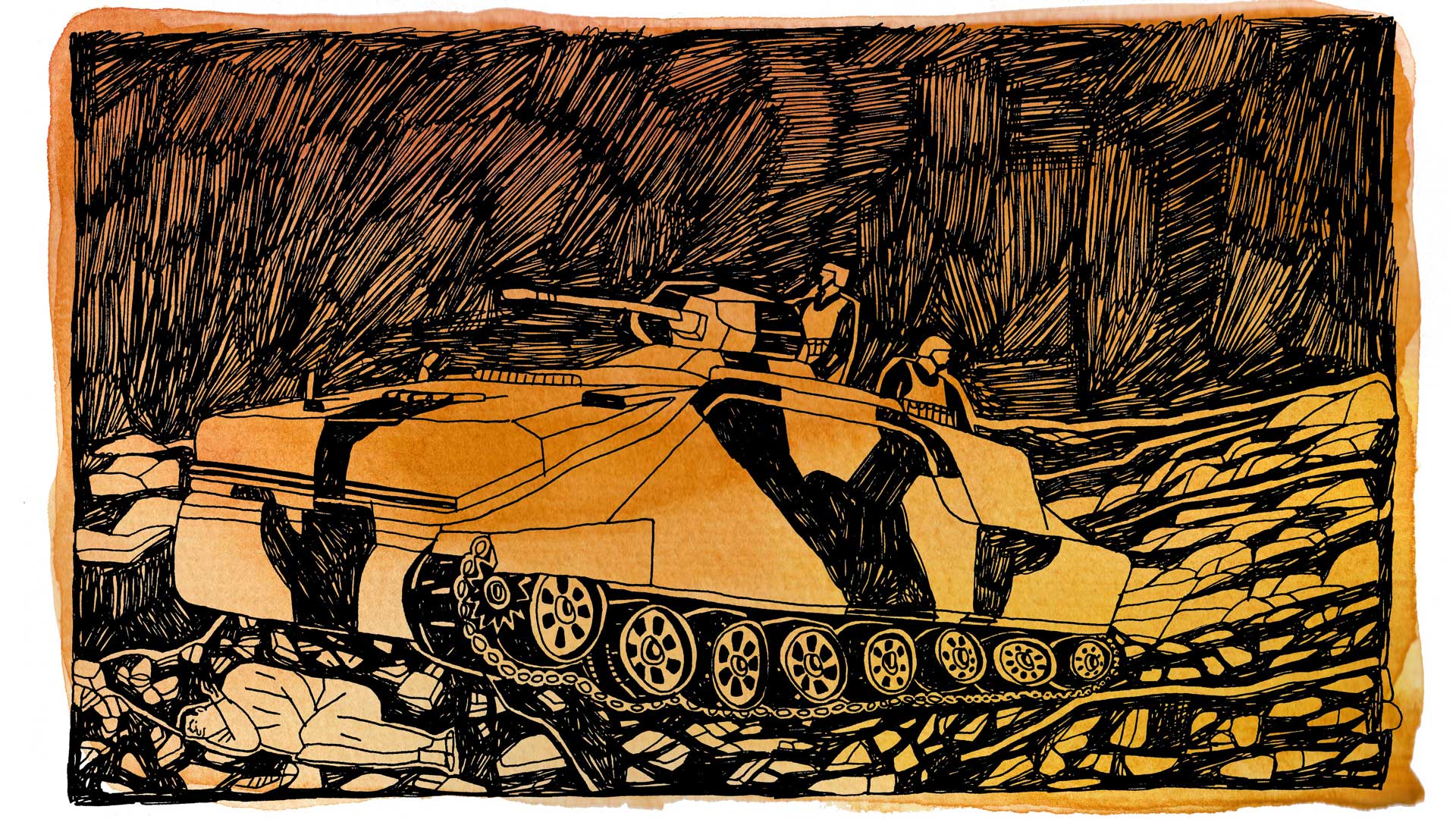
He then walks a few kilometers to the first border village from where he can take a bus to Gaziantep. There, his Turkish contact is waiting for him. " I was able to rest for a while and go to his house to take a shower, and then I called my brother."
The latter already knows about Fayçal's desertion. They decide to meet in Istanbul. To do so, Fayçal has to take another bus that runs between Gaziantep and Istanbul, 1,200 km away. The journey should take almost a day.
At a police roadblock, the bus stops: an identity check. Fayçal is terrified of being found out. He doesn't understand a word of Turkish. Miraculously, the officer doesn't notice him and just checks the person sitting next to him. The young Tunisian finds this hard to believe. Luck is on his side again.
Arriving at his destination, he books himself into a guest house and waits for his brother. ‘’ He stayed a few days, gave me some money and then left."
" At that point, I really hesitated," recalls Fayçal, " Should I go back to Tunisia, stay in Turkey, or run away to another country, to Europe?’’
Go home?
But Fayçal resigned himself and flew to Tunisia. He was able to keep his passport and identity card with him, unlike many other foreigners who have their passports confiscated on arrival in Syria to prevent them from leaving.
When Fayçal lands at Tunis-Carthage Airport, the authorities were waiting for him. He confesses to returning directly from Syria. " I was frank right away, so they didn't hit me," he says with a small smile.
The young man is arrested. At the anti-terrorist brigade in El Gorjani, the agents are less lenient. " But I was prepared for it," admits Fayçal. " I know my country and I know very well that we're not in Europe and not strict about respecting human rights.’’
Fayçal is then transferred to the Bouchoucha detention center, where he is also subjected to violence. " I don't know if it's their system, but there are two officers. One talks to you nicely and the other gives you a beating," he describes. " I was honest and I told them everything." The police want the names of the Tunisians he may have met but, for the most part, the young man only knows their nicknames. " They didn't want to believe me, but I wasn't going to make up names."
He spends four days in the detention center before appearing before a judge. As soon as he sees him, the judge tells him, " You've just come back from Syria, for you, you will go directly to prison!" Many charges are brought against Fayçal: " He accused me of a thousand things... I couldn't even read before signing; he wrote what he wanted." Despite all the charges against him, his lawyer managed to plead his case and to get him released, pending his next hearing.
At the end of the third hearing, the judge finally decides not to prosecute. " I have nothing to blame myself for in Tunisia. Here, I never had any problems, I worked, I led a quiet life," he says. The fact that Fayçal didn't really fight and that he agreed to tell his whole story and collaborate from the moment he arrived must have worked in his favor.
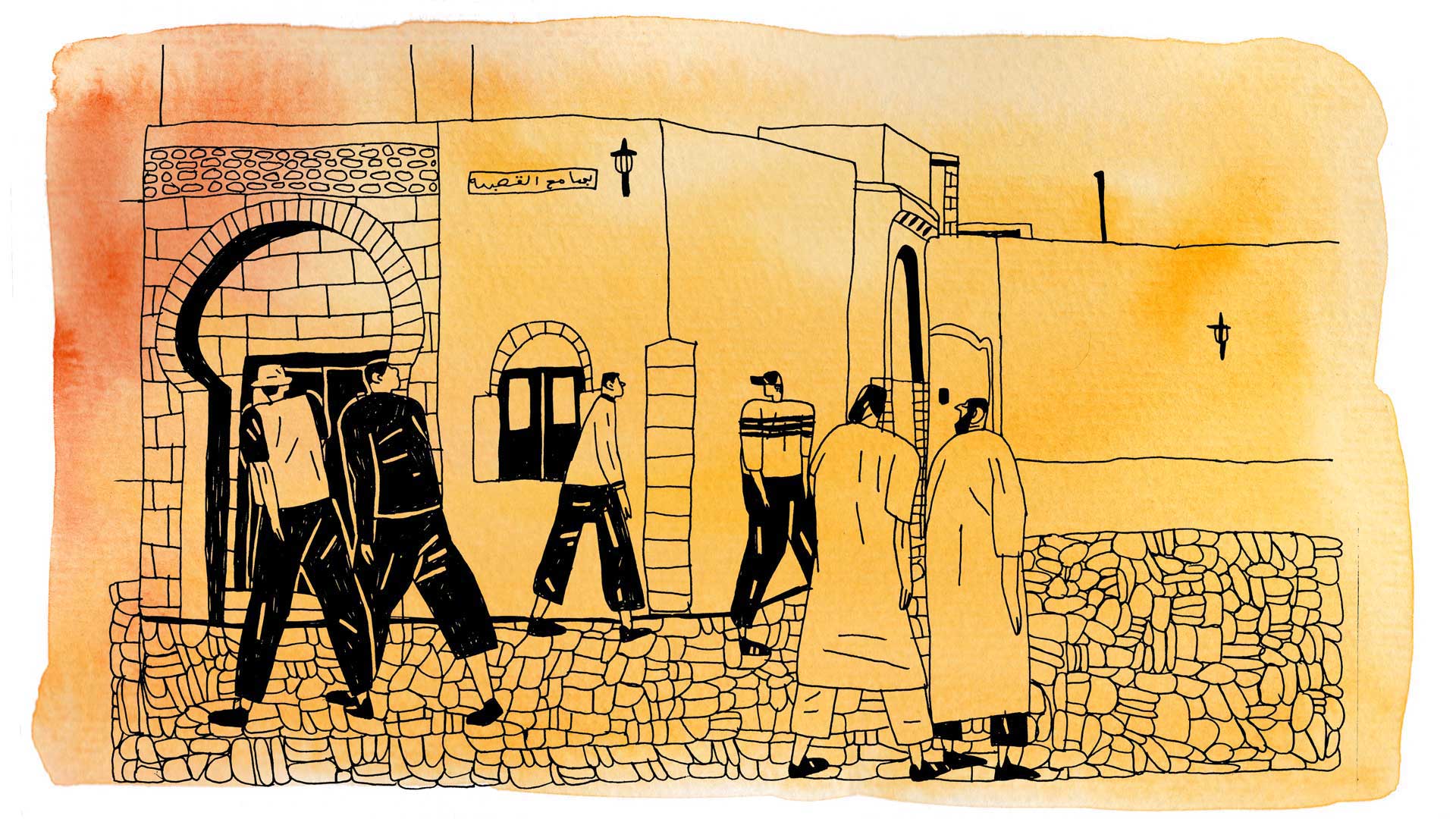
Fayçal thus returns to live with his parents. For a month, he doesnt come out of his room. He suspects that he is being watched and that his phone is being tapped, but he doesn't care. " Apart from my family, I don't talk to anyone anyway."
He does, however, receive a visit from a " good friend, a brother." But soon the young man realizes that he didn't come to check up on him, but rather to question him. " He asked me what group I was with, why I had come back," says Fayçal. The friend doesn’t like what Fayçal has to say, especially his criticism of Daesh. For him, Fayçal has not fulfilled his religious duty and is probably a spy. For others, he is a dangerous terrorist.
Now, Fayçal regrets having left, acknowledging the heavy consequences it has had on his life. " I compromised my chances to work, travel, and even get married," he sighs. But at the same time, the young man says he is " happy" to have discovered the reality behind the promise of jihad and the deep hypocrisy of the Salafist groups. " I'm still practicing, religion is important for me, but this experience has opened my eyes.’’
On a daily basis, Fayçal is regularly stared at by people in his neighborhood. " People avoid me and nobody talks to me. I feel like they'd rather I'd have died over there.’’
Fayçal is not surprised by the criticism. For him, it is proof that the media and society " don't try to understand what can happen" to the minds of these Tunisians who have left for Syria. He stresses the importance of establishing a dialogue, especially " with young people on the margins of society," as well as the need to ask the right questions. " Not all of them are bloodthirsty terrorists.’’
"When we say imprison them or kill them, we're only stirring up violence."
Fayçal believes there is a need to find a way to reintegrate into society people who, like him, have gone astray. " Everyone has their own story, everyone has their reasons. We don't forgive those who've gone. No one tries to understand.’’
